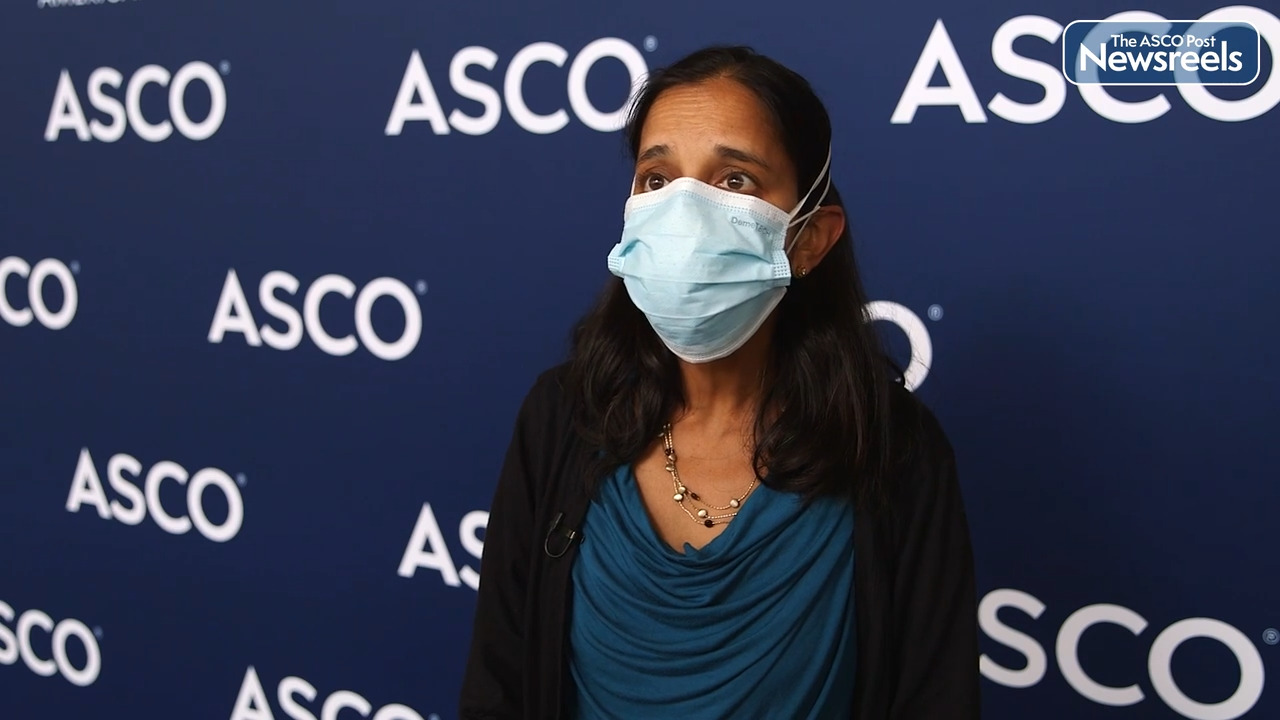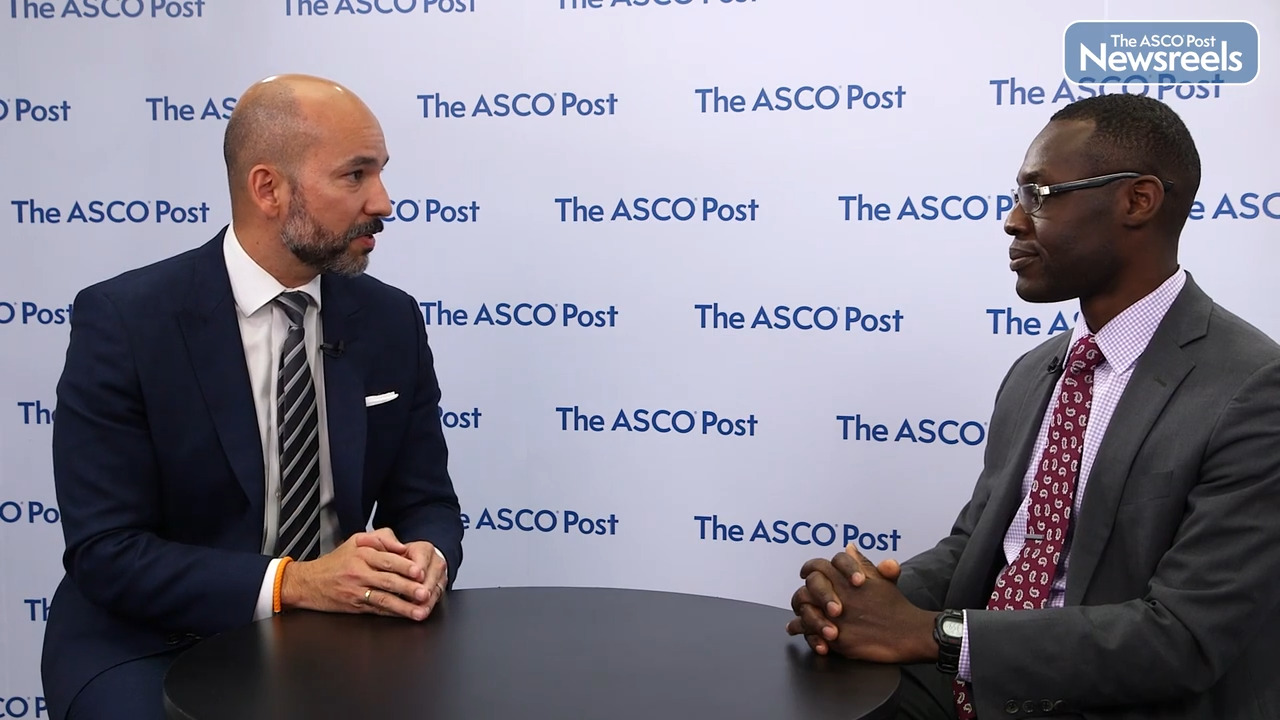Transcript
Disclaimer: This video transcript has not been proofread or edited and may contain errors.
Ursula Matulonis: Nicoletta great to see you. Congratulations on this study. It's a really fascinating study with really intriguing results. Can you tell us about the mechanism of action of Relacorilant and how it inhibits ovarian cancer growth?
Nicoletta Colombo: It has been shown that cortisol main use chemotherapy resistance by interfering with some apoptotic pathways, which cytotoxic agents such as Nab-Paclitaxel utilize. So basically Relacorilant is a selective glucocorticoid receptor modulator, and binds to the GI, the glucocorticoid receptor and suppresses the activity of cortisol. So in this way, of course, cytotoxic agents, such as Nab-Paclitaxel may use their apoptotic pathways and induce apoptosis and cells deaths. So that's the rational for using this drug in ovarian cancer patients.
Ursula Matulonis: Yeah. It's a really unique, unique mechanism of action that I don't think's really been tested before.
Nicoletta Colombo: No, it's really unique. It's very interesting because even very low level of cortisol may really induce chemotherapy resistance. So by suppressing this activity of cortisol, we may enhance the efficacy of cytotoxic agents.
Ursula Matulonis: And in this trial, so there were three arms. There was control Nab-Paclitaxel and then two different schedules of Relacorilant added to Nab-Paclitaxel. Can you just, did you talk about those two different schedules and why they were tested?
Nicoletta Colombo: Yeah. One schedule was just very, I mean, low level of continuous Relacorilant and the other one was Relacorilant given the day before, the day off, and the day after chemotherapy. Why that? Because on one end, continuous administration may provide a continuous antagonist of cortisol, but on the other hand, by giving higher dose of Relacorilant around times of maximum chemotherapy exposures may provide a better antagonist. So that's why we decided to use or to test these two different schedules.
Ursula Matulonis: Yeah. Gotcha. And tell us about the results which are intriguing and I think really promising.
Nicoletta Colombo: Yeah, this is a randomized phase two, and we enroll 178 patients in these three arms. So the comparator arm, which was Nab-Paclitaxel alone given the day 1, 8, 15 of a 28 day cycle. And then we have the two Relacorilant arm, the intermittent and continuous. These patients were really very heavily retreated patients up to five prior lines of chemotherapy. All but one had received prior taxane. More than 50% had received bevacizumab. And about one third had received even PARP inhibitors, so really a very, very heavily pretreated population. Moreover, 36% had a platinum refractory disease, and some of them even primary platinum refractory disease. And actually there was an unbalance on the percentage of patients with primary platinum refractory disease, which was higher in the intermittent scheduling arm. So, so patients were randomized in these three arms, and then the primary endpoint was progression free survival. And we presented already the data at ESMO last year, and we demonstrated a significant improvement in progression free survival for patients receiving the intermittent schedule of Relacorilant. And so this was the primary endpoint, but today, I mean at this conference, I will present the overall survival data. And it's very interesting because already at that time, we saw a trend for an improvement in overall survival. And this trend has been now confirmed. Actually, we see that for the intermittent schedule compared to the standard arm, we have a hazard ratio 0.67, which does not reach really statistically significant, but is very close. But what we did the scenes, as I said, there was an imbalance in the primary platinum refractory patients population, we perform subgroup analysis taking away the primary platinum refractory. And in this situation, the hazard ratio is 0.63 and becomes statistically significant. So I think this is a great news because we know that patients with platinum resistant ovarian cancer represent a very high unmet need. And we now have a completely different drug with a very unique mechanism of action, which can potentiate the efficacy of chemotherapy.
Ursula Matulonis: Incredibly exciting. What's the future for the drug? What are your next plans?
Nicoletta Colombo: Yeah, of course. One thing I didn't say is that also the toxicity profile was quite good. And, we did not observe any increase in toxicity, even though I must say all patients receive prophylactic GCSF, but also in the comparator arm, 46% receive GCSF. So drug, well tolerated. Quality of life data very good, no, no detrimental effect. And that's why we want to do a prospective randomized phase three study. And this is planned, and we'll start at the end of the year. It's called ROSELLA. And so more than 300 patients, 360 patients will be randomized to receive Relacorilant plus Nab-Paclitaxel. Theirs is a physician choice chemo could be taxane, Nab-Paclitaxel, or liposomal doxorubicin. And the primary point will be investigator assessed progression free survival. And of course also a key secondary endpoint will be overall survival.
Ursula Matulonis: Yeah. Awesome. Congratulations again. Really wonderfully conducted trial and really promising results. So thank you so much.
Nicoletta Colombo: Thank you. Thank you. Thank you very much.





